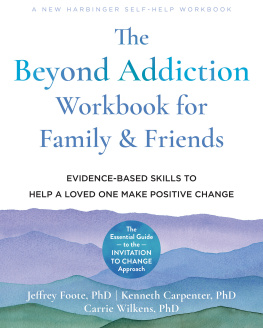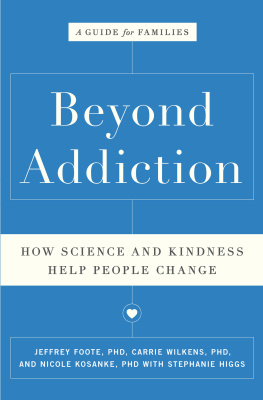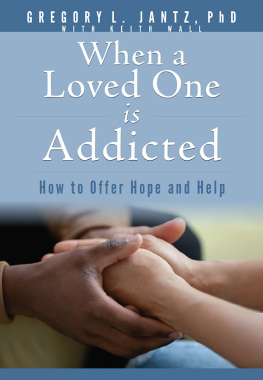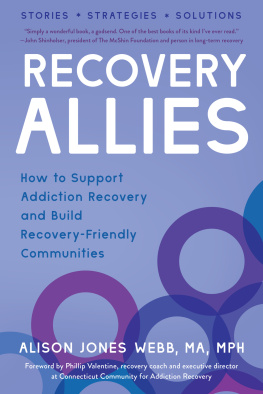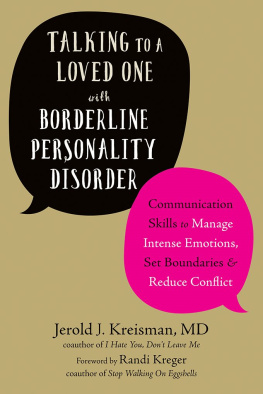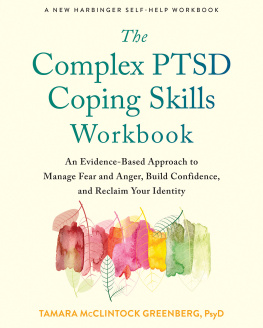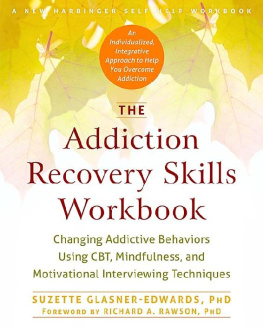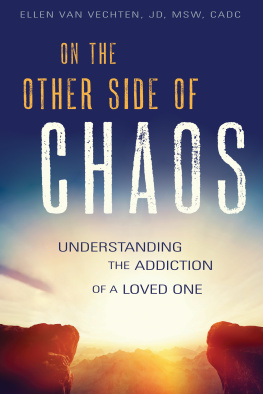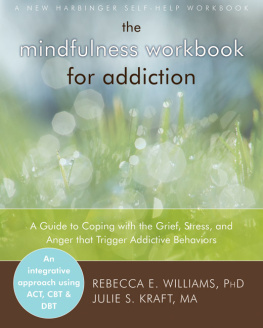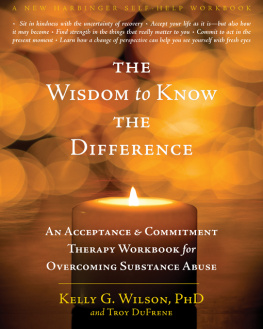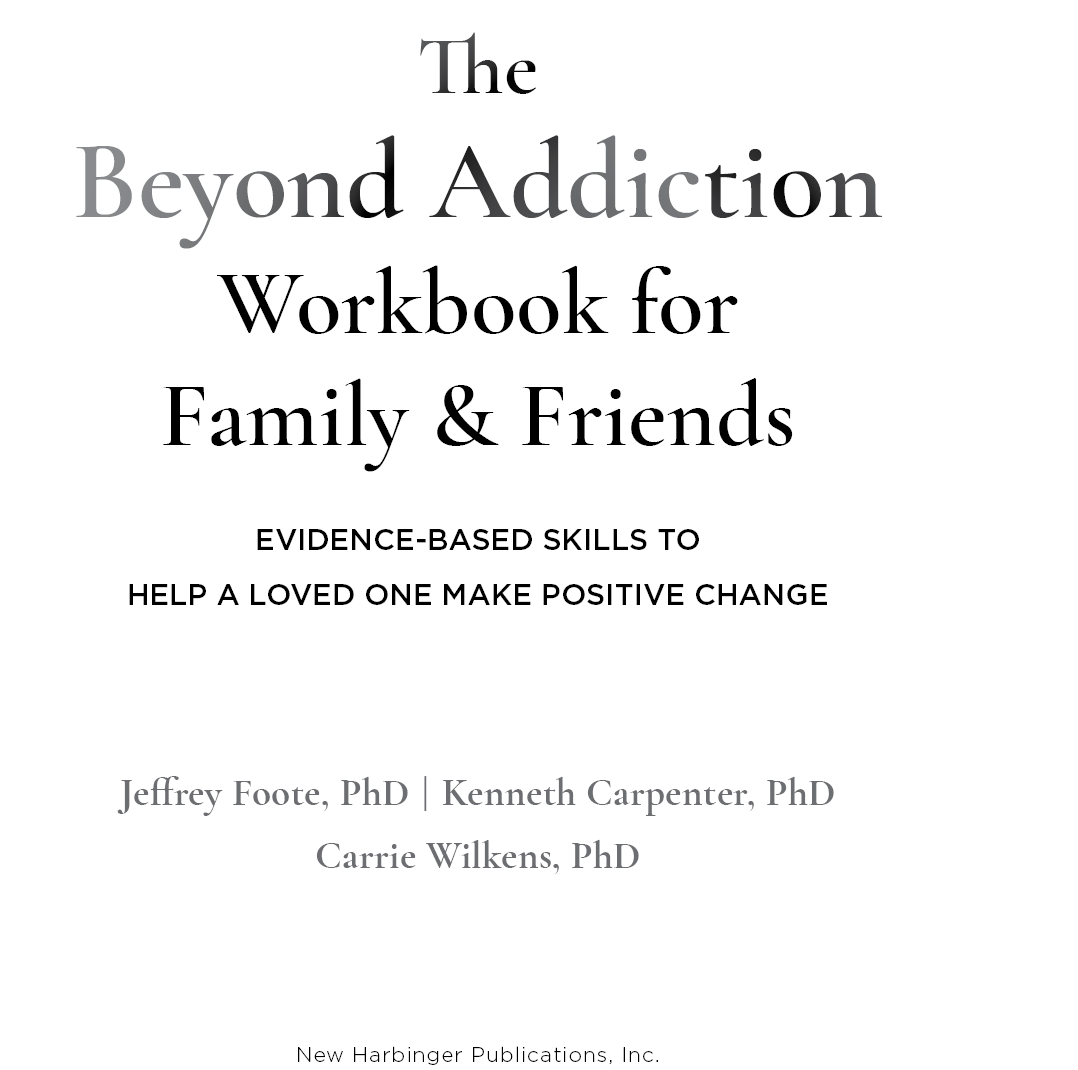If someone you love is harmfully using drugs, have you been told theres nothing you can do? Its just not true. The Beyond Addiction Workbook for Families and Friends is a compassionate road map for family and friends to follow, offering an impressive array of evidence-based tools explained in everyday language. Its Invitation to Change approach is just that: an invitation to consider and try out various practical things you can do to make a difference. It blends science and kindness with a wealth of clinical experience in helping people change.
William R. Miller, PhD, emeritus distinguished professor of psychology and psychiatry at The University of New Mexico, and author of Motivational Interviewing and On Second Thought
It looks like the Center for Motivation and Change has done it again. They have updated and enhanced their information regarding the best ways to work with individuals who have problems with substance use. Covering several evidence-based treatments, they have beautifully created a way for all substance-use providers to learn and use state-of-the-art, down-to-earth information. This is a workbook that should be on your desk.
Robert J. Meyers, PhD, emeritus associate professor of psychology at The University of New Mexico; director of Robert J. Meyers, PhD & Associates; and creator of Community Reinforcement and Family Training
An essential, empathetic, evidence-based, and hopeful guide for loved ones of people with addiction who want to help but often either dont know how or have been poorly advised about what actually works.
Maia Szalavitz, author of Undoing Drugs, contributing opinion writer for The New York Times, and author or coauthor of seven other books
When my son was addicted, our family was in turmoil. I was desperate to help my childto save himbut the advice I got was unhelpful and some was dangerous. If only The Beyond Addiction Workbook for Family and Friends was available then. Its a godsend that can guide us from hell to healing.
David Sheff, author of Beautiful Boy
Sorely neglected in the world of addiction treatment are families and other loved ones of people who struggle with misuse of substances. For the first time, in The Beyond Addition Workbook for Family and Friends, three solid, science-based approaches shown to have greater benefit than those traditionally used in addiction treatment are woven together to bring about lasting change. From strategies to improve communication to ways to invite loved ones to enter treatment to using positive reinforcement in order to get the behavior you want, this workbook is loaded with practical, self-paced guide sheets and wisdom that will help families, friends, treatment professionals, and educators.
Anne M. Fletcher, MS, author of Inside Rehab, Sober for Good, the Thin for Life books, and Weight Loss Confidential
From the opening paragraph its clear these authors know what they are talking about! They bring a fresh, scientific, and underused perspective to the crucial subject of helping a loved one address addictive problems. They balance a focus on taking care of yourself, and engaging in new and targeted efforts to help your loved one. This workbook sets a new standard for how to educate families about these issues.
Tom Horvath, PhD, cofounder and past president of SMART Recovery; president of Practical Recovery Psychology Group; and author of Sex, Drugs, Gambling, and Chocolate
When a loved one struggles with addiction, have you ever wondered how to keep your heart open, stay connected, be maximally helpful, and not become a martyr or an enabler? This remarkable program shows you how. Based on the solid science of mindfulness, acceptance, and compassion, this book will ease you into an entirely new mindset. Get ready to sigh with relief. Then just practice and see what happens.
Christopher Germer, PhD, instructor of psychiatry at Harvard Medical School, codeveloper of the Mindful Self-Compassion Program, and coauthor of The Mindful Self-Compassion Workbook
The Beyond Addiction Workbook for Family and Friends provides excellent guidance for people who deeply care for someone problematically using substances. As a psychologist, Ive consulted with world-class clinics whose main aim is helping people with substance concerns, and I wish I had this workbook as a resource to train professionals and laypersons about these effective techniques for change. The authors provide a great deal of practical, impactful support and direction for you.
D.J. Moran, PhD, BCBA-D, founder of Pickslyde Consulting, and coauthor of ACT in Practice
One of the most overlooked aspects of the experience of those who are tangential to recoverythose that have a partner or child or friend or family member that struggle with addictionis how much of a growth opportunity it can be for them personally; and in fact is a requirement for any kind of transformation to take place. There is a dearth of dynamic and effective resources available for this population; this workbook is the gold standard. If you want to put compassionate, effective, transformational, and evidence-based practices into use to help both yourself and your loved one, you absolutely need this workbook.
Holly Whitaker, author of Quit Like a Woman
Publishers Note
This publication is designed to provide accurate and authoritative information in regard to the subject matter covered. It is sold with the understanding that the publisher is not engaged in rendering psychological, financial, legal, or other professional services. If expert assistance or counseling is needed, the services of a competent professional should be sought.
NEW HARBINGER PUBLICATIONS is a registered trademark of New Harbinger Publications, Inc.
New Harbinger Publications is an employee-owned company.
Distributed in Canada by Raincoast Books
Copyright 2022 by Jeff Foote, Carrie Wilkens, and Kenneth Carpenter
New Harbinger Publications, Inc.
5674 Shattuck Avenue
Oakland, CA 94609
www.newharbinger.com
Cover design by Amy Daniel
Acquired by Jess OBrien
Edited by Joyce Wu
All Rights Reserved
Library of Congress Cataloging-in-Publication Data on file
Contents
Introduction:
An Invitation to You
Welcome!
If you picked up this guide because you love or care about someone using substances in a problematic way, theres a good chance youre dealing with a lot. You may be experiencing disappointment that your family is not normal or that the dreams you had for this person may never be realized; anger at the situation, at them, or at yourself for not being able to solve their problems; fear that theyll hurt themselves or you or maybe even die; shame at the thought that you somehow failed them or even that you may in some way be the cause; or isolation because you cant talk to others about what you and your loved one are going through. All these feelings and reactions are completely normal, valid, and hard to bear. One parent described it like this:
We have been through some stuff as a family , but nothing could have prepared us for our daughter falling down the well of drug use . Its been two years of long nights , a knot in my stomach , and tears and fights between all of us , including my husband and me . Thank God we have a road map now , because we were driving in the dark for a long time , and there is no worse feeling .
Helping someone struggling with substance use can be a very lonely journey, made worse by lack of understanding, fear, and the impact of stigma and shame. You want to help this person make positive changes in their life, but youve probably heard people say things like Once an addict, always an addict or They wont change until they hit rock bottom, making you feel as if theres nothing you can do to help. You may have been told youre codependent or an enabler, which in turn has led you to believe that you shouldnt help or that you have a problem yourself. And to top it all off, the pejorative words commonly used to describe the person you care about (alcoholic, addict, dirty, junkie) are loaded with stigma, shame, and pessimism about the potential for change.

